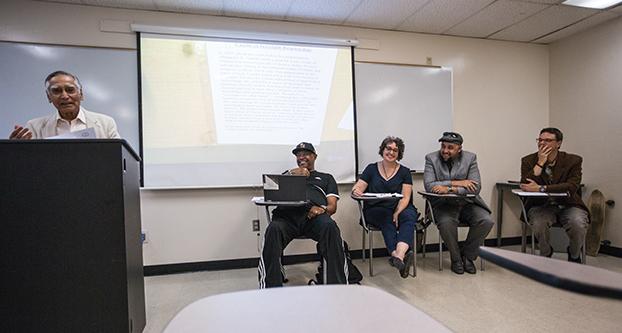International Day of Peace is a day dedicated to world peace, specifically the absence of war and violence. The dedication was enacted by the United Nations and first celebrated on Sept. 21, 1982.
Since the first celebration, many have taken the dedication to peace into their own hands and have celebrated their forms of peace.
Dr. Sudarshan Kapoor, professor emeritus of social work education at Fresno State and his class, “Peace Building and Conflict Transformation,” presented a panel discussion regarding Interfaith Peace-building.
The panel consisted of religious leaders in the Fresno community such as Rabbi Laura Novak Winer of Temple Beth Israel, Rev. Dr. Christopher Breedlove of Community United Church of Christ, Reza Nekumanesh Director of The Islamic Cultural Center of Fresno and Pastor B.T. Lewis of Rising Star Missionary Baptist Church, Fresno.
On Wednesday, the panelists met at Fresno State and discussed what their denominations are doing to help the Fresno community and beyond to build peace and create social change.
“It’s really important [to] realize and understand the importance of this concept. All of my life I have been promoting Interfaith Peace- building in this community and as well as abroad,” Kapoor said. “I learned a long time ago from somebody, that if the world’s religions are not at peace with each other, there won’t be any lasting peace.”
Winer, the only female rabbi in Fresno, said of Interfaith Peace-building, “We raise money to make sure people in Africa can get solar ovens so that they can cook food. The Jewish community around the world always helps when there is a big disaster.”
The Jewish community, according to Winer, is working with other religious groups in Fresno to “fix what’s broken here in Fresno.” Winer says her denomination has an advocacy group based in Washington D.C, called The Jewish Religious Action Center. The group lobbies with California senators and representatives to “make change and fix the problems that exist in our country,” said Winer.
Rev. Breedlove credits UCC, Fresno, for being a liberal and progressive church aligning with progressive political topics such as marriage equality and “social justice progressive stances,” said Breedlove.
“There is a resolution in the UCC denomination called ‘Just Peace’. It’s combining the actions of justice and peace. During certain protests, especially Black Lives Matter, you often hear the phrase ‘no justice, no peace,’ and sometimes critics hearing that chant say ‘is that advocating some kind of militant and violent action?’”
“It’s simply the realization that until we have justice for everybody, equality for everybody, until all lives matter to the point that, especially marginalized lives, and demographic groups that have been prejudiced and exploited, until we can say black lives matter, brown lives matter — all lives don’t matter,” Breedlove said.
Nekumanesh said, “One of the ways you could work for justice and establish justice is recognizing each other in how they are created and honoring what choices they’ve made in their beliefs and the way they live.”
“Fresno has a wonderful, beautiful, most magnificent interfaith group, that you’ve ever seen anywhere,” said Nekumanesh. He said the cultural center has many groups it works with who bring together the various faiths of Fresno to conquer social justice issues.
Nekumanesh shared an experience regarding Dr. Robert P. Sellers, Chair of the Parliament of the World’s Religion.
“He said he has never seen a more vibrant interfaith community anywhere in the world,” Nekumanesh said.
Lewis opened with a quote from Mahatma Gandhi, “We have to be the change that we want to see’.” Lewis added, “The minds and consciousness of our communities need to change before there can be peace.”
Lewis says that if one can change the mindsets of those in the community, it will facilitate policy change.
“Part of it is changing the consciousness or the thinking of people in our community. If you change their thinking, you can change policy and you can change some of the systems and institutions in our community,” Lewis said. “When they were created, they had no concept of diversity, so they limit certain areas of our city.”
“When we admit that there’s a problem, and have a good conversation about the problem, then we can turn it around. We can repent, then we can turn it around. Then there can be forgiveness, but don’t ask me to forgive you and you’re still stepping on me,” said Lewis.
To conclude their peace-building ideas, Kapoor and the panelists recalled the Eleanor Roosevelt quote, “It isn’t enough to talk about peace. One must believe in it. And it isn’t enough to believe in it, one must work at it.”




